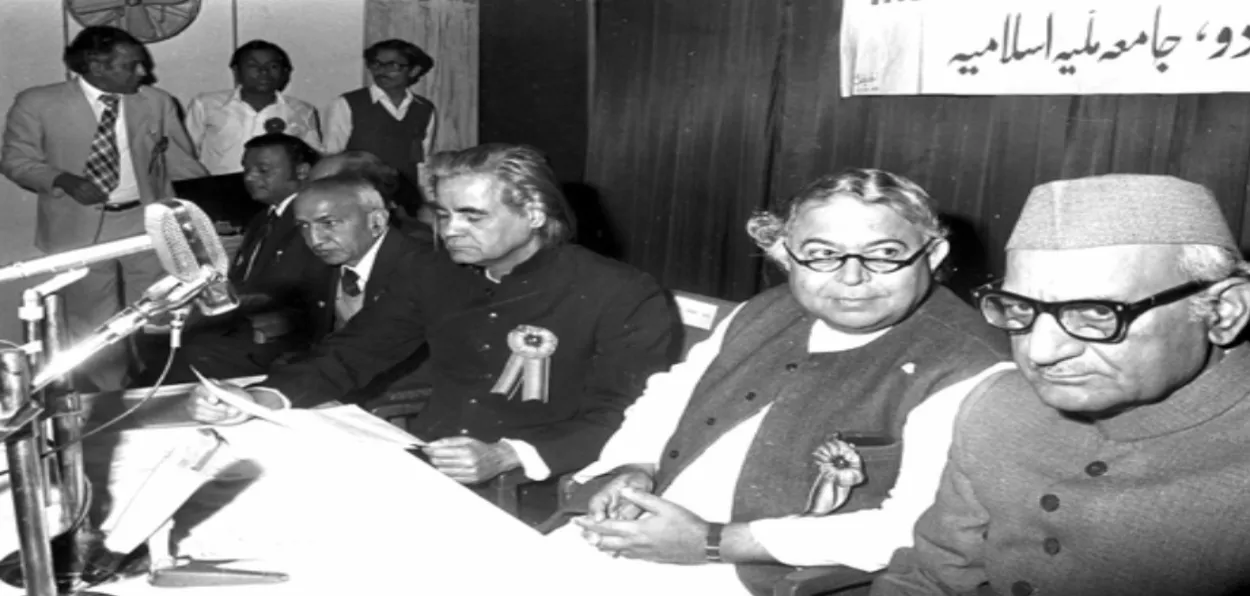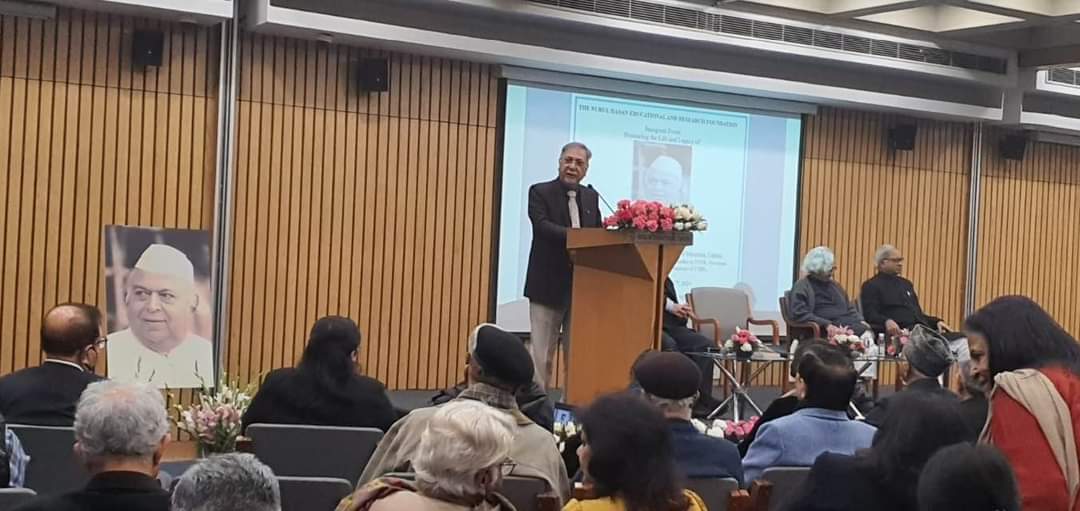
Saquib Salim
“I (Prof. Nurul Hasan) myself addressed a letter in February to all the State Governments in which I made a special plea that the Collectors and District Superintendents of Police be held personally responsible to ensure adequate protection to Harijans against any kind of discrimination arising out of untouchability and that they should take prompt action suo-motu in all instances where the practice of untouchability comes to their notice.”
Prof. Nurul Hasan, the then Minister of Education, Social Welfare, and Culture, said this on the floor of the Parliament on 23 May 1972.
The Nurul Hasan Educational and Research Foundation held an event to discuss the life and contributions of Prof. Nurul Hasan in the capital recently. Shahid Mahdi, former Vice-Chancellor of Jamia Millia Islamia, Prof. S. Ali Nadeem Rezavi, AMU, Prof. Harbans Mukhia, formerly with J.N.U.) Prof. Hasan Mahmud (Baroda University and Jamia Millia Islamia) spoke about the legacy of Nurul Hasan as a historian and education minister. Hamid Ansari, former Vice president of India, and Najma Akhtar, ex-VC of Jamia Milia Islamia University were among those present on the occasion.
Prof. Rezavi highlighted the role of Nurul Hasan as a mentor of historians. He said that Hasan “was a visionary who built institutions and opened new fields and areas of research and knowledge.”
He explained how Hasan guided him in his education right from choosing subjects to pursuing higher studies. “Nurul Hasan did not believe, like some modern-day scholars, to further his research and publications. He directed research and helped open new fields of research. Under his able stewardship, new vistas were opened and research in myriad themes started in right earnest”, he said.
The speakers said he was also a crusader for social justice and equality and this aspect of his personality remains unknown.
Prof. Nurul Hasan became a Union Minister on 24 March 1972 and started working for an India where everyone had equal opportunities. He proposed an amendment to the Untouchability (Offences) Act, 1955.
He proposed, “First of all is the question of amendment relating to the raising of the quantum of punishment under the Act. The second is making offenses under the Act non-compoundable. Thirdly, bringing within the definition of ‘place of public worship’ privately-owned temples used as places of public worship and disqualifying persons convicted under the Act from contesting elections to the Central and State legislatures. Lastly, the utterances of public personalities justifying untouchability whether on historical or philosophical grounds are also proposed to be brought within the purview of the law.”
 Prof. S. Ali Nadeem Rezavi speaking at the seminar
Prof. S. Ali Nadeem Rezavi speaking at the seminar
Though Prof. Hasan came from an elite family, he realised the ills of a caste-based society. He told the parliament that even though he was proposing an act against caste atrocities, the act could not completely eradicate this evil and bring social equality.
Prof. Hasan said, “We need a social revolution. We need a basic change in our outlook. Social and political workers must mobilise the masses of our people to arouse their conscience against this canker of untouchability.”
He understood that the abolition of zamindari and legislation against caste-based oppressions would be violently resisted by the privileged sections. He told the parliament, “I am also conscious of the fact that as land legislation is going to be enacted in various States and changes of land relationships are in the offing, social tensions have increased and as a result of these social tensions attempts have been made to use violence against the Harijans. It is the duty of all political parties and all social organisations to ensure that Harijans are protected but the duty of the Government is even more than that of the social workers and of the political leaders.”
Prof. Hasan considered it his duty to ensure that the school textbooks teach against casteism and social inequalities. He told the parliament, “In the matter of textbooks meant for schools, we have to be very careful about what sense of values we wish to inculcate. That was why I started my very speech by saying that in the educational system, we will have to take measures to ensure that the values we inculcate in the new generation are not values that will tolerate this canker of untouchability.”
It was during his tenure that Towards Equality: The Report of the Committee on the Status of Women in India (1974-5) was prepared and placed in the parliament. This was a study of Indian women’s condition authorised by the Government of India undertaken by Phulrenu Guha, Maniben Kara, Savitri Shyam, Neera Dogra, Vikram Mahajan, Leela Dube, Sakina A. Hasan, Urmila Haksar, Lotika Sarkar, and Vina Mazumdar.
Many believe that this report ‘laid the foundation of the women's movement in independent India, highlighting discriminatory sociocultural practices, political and economic processes.’
Vina Mazumdar, one of the authors of the document later noted in her memoir, “He (Nurul Hasan) convinced the Prime Minister that appointing me as Member Secretary and extending the Committee’s term by one more year (1974–75) would enable India to save face, by sending a document on the Status of Women to the United Nations at the beginning of 1975 (already declared as the International Women’s Year). The Prime Minister -reluctant to lose face before the UN – had to agree. I can however now state confidently that if she had any clue about our emerging conclusions, she would never have agreed.”
Vina recalled later that Nurul Hasan asked them not to discuss their findings with anyone without his clearance. At that time she believed that Nurul was trying to ‘gag’ them like any other politician. Vina wrote that she was furious as Phulrenu did not argue against the minister only to later realise, “It was Prof. Hassan’s major contribution to our exercise. The Minister had realized months earlier, especially after our collective resignation – that the Report would be uncomfortable for the Government in Office. He had to ensure its publication before the Prime Minister, or his other colleagues learned about our conclusions.”
The report was tabled before the parliament in 1975 and a press conference was also called. The press note was prepared by the Joint Secretary Brij Bhushan Sahay who later recalled that Prof. Nurul Hasan told him, “I am entrusting this task to you as you have been her student. You must ensure that your Note does not tamper with the nuances of the Report.”
Vina noted, “Professor Nurul Hassan told somebody ‘Had I not obtained those orders from the government before the Report was submitted, that document would not have seen the light of day.’ Before the rest of the government could realize what the Report contained, it was placed before Parliament.”
The report led to several social and political movements in the country. The government was forced to address several issues which were kept under wraps in the name of culture. Famous feminist author Urvashi Butalia writes, “And to this day, the findings of that Report remain grim reminders of the need to change the realities of women’s lives in India, a cause that remained close to Vinadi’s (Vina Mazumdar) heart all her life.”
ALSO READ: Islam is not in conflict with modernity
Prof. Nurul Hasan was truly what Prof. Ali Nadeem Rezavi said, “The fact of the matter is that he was a person who provided gravitas, honour and meaning to all the posts and positions which he held.”
